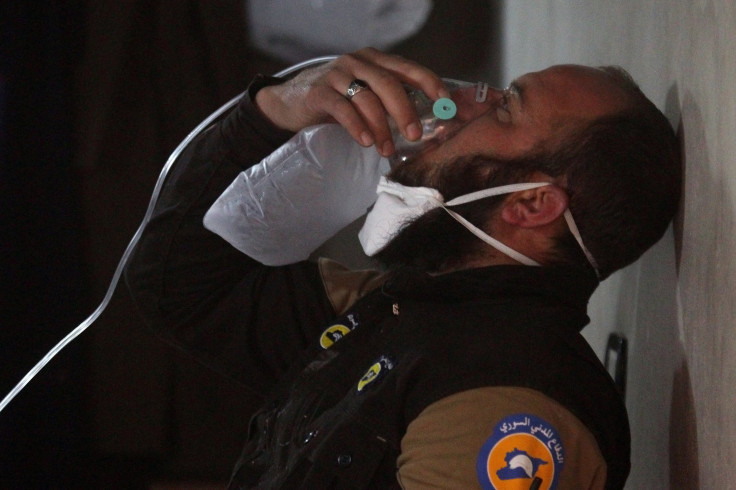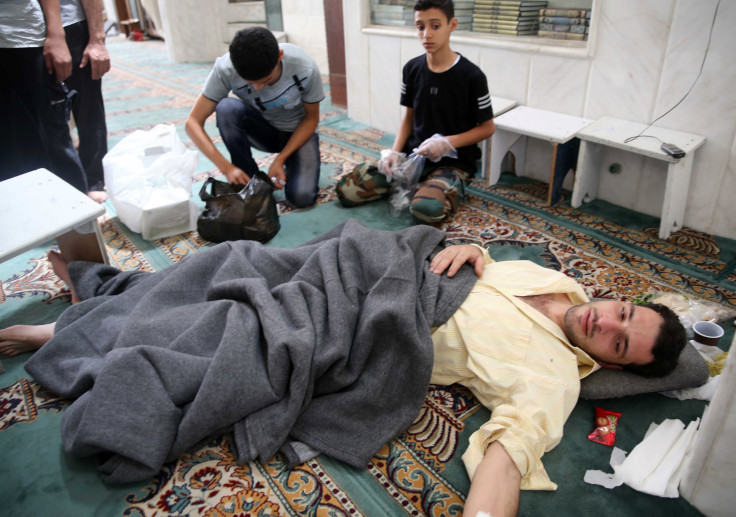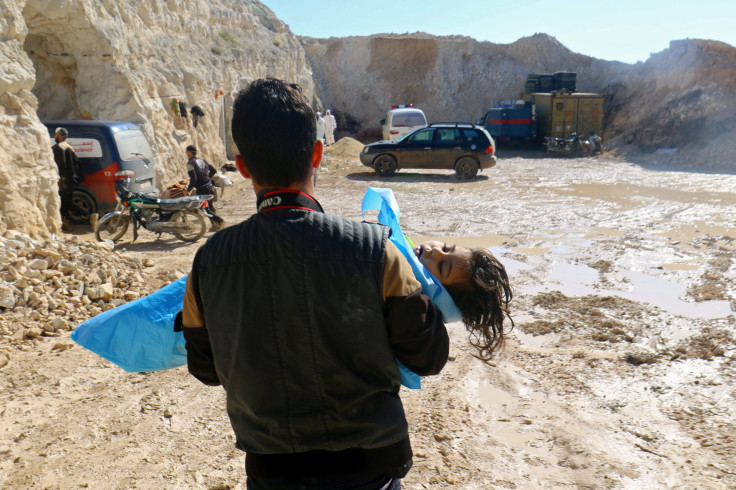Syria Chemical Weapons Timeline: A History Of The Assad Regime Attacking Civilians

The Syrian Civil War began in March 2011 after anti-government protests against President Bashar al-Assad's human rights abuses. But the rebels' efforts to oust Assad were unsuccessful, leading to a brutal war between government forces and opposition supporters. The war became even more complex when the Islamic State, also known as ISIS, took parts of Syria in 2014 — a third army that was opposed to both Assad and the rebels.
Read: What Is Sarin? Chemical Attack In Syria Used Nazi Nerve Gas
The U.S. intervened in 2013, providing $1 billion annually to the rebels. One of the Obama administration's main grievances with Assad was his regime’s use of chemical weapons to kill civilians — a brutal method brought back into international headlines Tuesday after a chemical attack killed at least 58 people.
Read: Why Is Russia In Syria? Here's Why The Kremlin Got Involved In Another Country's Civil War
Although Syria claimed it was not responsible for the attack, many international intelligence agencies doubted the claim and said the attack was conducted by the Assad regime.
Below is a timeline of events concerning Syria’s use of chemical weapons.
July 23, 2012 — Syria’s possession of chemical weapons was confirmed by a Syrian Foreign Ministry official but he said the weapons would only be used against “external aggression,” not against the Syrian people.
“Any stock of W.M.D. or unconventional weapons that the Syrian Army possesses will never, never be used against the Syrian people or civilians during this crisis, under any circumstances,” said Foreign Ministry spokesman, Jihad Makdissi, according to a New York Times story from 2012. “These weapons are made to be used strictly and only in the event of external aggression against the Syrian Arab Republic.”
Aug. 20, 2012 — President Obama drew a red line on chemical weapons. If Assad did utilize the weapons, Obama announced, he would consider significant intervention into Syria.
Dec. 23, 2012 — Syria used chemical weapons against civilians for the first time, according to reports from opposition activists. At least six rebel fighters were killed by a poisonous gas, the activists said.
March 19, 2013 — At least 26 people were killed in gas attacks in two Syrian cities. Both the Syrian government and the Syrian opposition accuse each other over the attack. A United Nations investigation later found that the victims were killed by the poisonous sarin nerve gas, but the report did not conclude who triggered the attack.
March 20, 2013 — Obama said the use of chemical weapons in Syria was a “game changer.”
June 13, 2013 — The U.S. intelligence community had “high confidence” that Assad had attacked rebels with chemical weapons multiple times, the White House announced.
Aug. 21, 2013 — More than 1,000 people — many of them civilians — were killed by suffocating from a gas attack in suburbs where the Syrian government had been attempting to drive out rebels. A U.N. report found that many were asleep when the attack occurred, and they suffered from convulsions and foaming at the mouth.

Aug. 30, 2013 — A U.S. government assessment was released, stating that intelligence agencies had a high level of confidence that the Assad regime was responsible for the attack, along with many others.
Aug. 31, 2013 — Obama announced he would ask Congress for authorization to strike Syria.
Sept. 20, 2013 — Syria declared its chemical weapons stockpile to the Organization for the Prohibition of Chemical Weapons (OPCW) in accordance with demands from the U.S. and Russia.
Sept. 27, 2013 — The U.N. Security Council ordered Syria to destroy its chemical weapons and said it would authorize the use of force if Syria did not cooperate.
Oct. 6, 2013 — After officials from the U.N. and the OPCW arrive in Syria to facilitate the destruction of Syria’s chemical weapons stockpile, it’s announced that the destruction of the weapons has officially begun.
Oct. 14, 2013 — Syria signs on to the Chemical Weapons Convention and provides details for its plans to destroy its chemical weapons.
June 23, 2014 — The OPCW announced that all of Syria’s weapons were removed. Syrian rebels, however, were not convinced — they believed the Assad regime had stockpiles of the weapons that were not fully accounted for.
May 8, 2015 — The OPCW found traces of sarin and other chemical weapons at a Syrian military facility that were not declared, Reuters reported.
Aug. 7, 2015 — After about half a year of reports about the Syrian government using chlorine gas attacks — which are not as toxic as some other weapons, but are still considered chemical weapons — against civilians, the U.N. Security Council authorized an investigation into the Syrian government’s use of chlorine weapons.
Aug. 10, 2016 — Hospital officials reported a chlorine gas attack in Aleppo.
Aug. 24, 2016 — A panel from the U.N. and the OPCW announced the Syrian government used chlorine gas in civilian areas at least twice in 2014 and 2015.
Sept. 7, 2016 — Syrian opposition activists reported a chlorine gas attack in Aleppo that killed two civilians.
Nov. 11, 2016 — The OPCW once again condemned chemical weapons use in Syria and called on the Assad regime to stop the attacks. The organization also called for additional investigations and inspections into Syrian military facilities.
Feb. 28, 2017 — The U.N. votes on a resolution to authorize sanctions against the Syrian government for their chemical weapons attacks, but China and dedicated Syrian ally Russia veto it.
April 4, 2017 — A sarin gas attack killed at least 58 people and possibly up to 100 people, including many civilians, in Syria’s Ibid province. Intelligence officers believed the Assad regime was responsible for the attack based on the planes flying over the area at the time the attack was carried out. The Syrian government denied responsibility for the attack.
April 5, 2017 — The U.N. Security Council called for an emergency meeting concerning the Ibid attacks. President Donald Trump condemned the attack in a press conference and said: “I will tell you that attack on children yesterday had a big impact on me – big impact. My attitude toward Syria and Assad has changed very much … You’re now talking about a whole different level.”

© Copyright IBTimes 2024. All rights reserved.






















